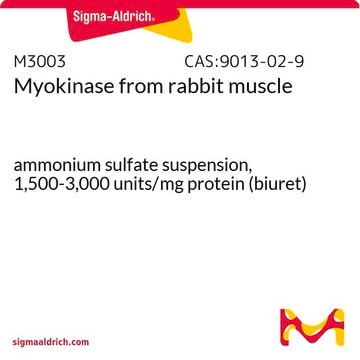Fontos dokumentumok
N2635
Nucleoside 5′-Diphosphate Kinase from bovine liver
buffered aqueous glycerol solution, ≥1,000 units/mg protein (biuret)
Szinonimák:
NDK, UDPkinase, nonmetastatic23(NM23), uridine diphosphate kinase, ATP:nucleoside diphosphate phosphotransferase, NDPK
About This Item
Javasolt termékek
biológiai forrás
bovine liver
Minőségi szint
form
buffered aqueous glycerol solution
specifikus aktivitás
≥1,000 units/mg protein (biuret)
tárolási körülmény
(Tightly closed)
technika/technikák
activity assay: suitable
idegen aktivitás
lactic dehydrogenase, myokinase, β-NADH oxidase, nucleoside monophosphokinase and ATPase ≤0.1%
tárolási hőmérséklet
2-8°C
Általános leírás
Nucleoside 5′-Diphosphate Kinase (NDK) is a ubiquitous housekeeping enzyme. Nucleoside Diphosphate Kinase exists in two isoforms in eukaryotic cells, NDK-A and NDK-B. These enzymes are found expressed both in the mitochondria and the cytoplasm.
Alkalmazás
- nucleoside diphosphate kinase (NDPK) assays
- coupled NDPK-luciferase assay to determine the amounts of Ras-bound guanosine triphosphate (GTP)
- non-metastatic protein 23 (NM23) growth stimulation assay
- in a study to assess inhibition of type I Fc epsilon receptor mediated Ca2+ influx and mediator secretion in rat mucosal mast cells
- in a study to investigate protein synthesis in rabbit reticulocytes
Biokémiai/fiziológiai hatások
Egység definíció
antitest
enzim
kapcsolódó termék
szubsztrát
Tárolási osztály kódja
10 - Combustible liquids
WGK
WGK 3
Lobbanási pont (F)
Not applicable
Lobbanási pont (C)
Not applicable
Analitikai tanúsítványok (COA)
Analitikai tanúsítványok (COA) keresése a termék sarzs-/tételszámának megadásával. A sarzs- és tételszámok a termék címkéjén találhatók, a „Lot” vagy „Batch” szavak után.
Már rendelkezik ezzel a termékkel?
Az Ön által nemrégiben megvásárolt termékekre vonatkozó dokumentumokat a Dokumentumtárban találja.
Az ügyfelek ezeket is megtekintették
Tudóscsoportunk valamennyi kutatási területen rendelkezik tapasztalattal, beleértve az élettudományt, az anyagtudományt, a kémiai szintézist, a kromatográfiát, az analitikát és még sok más területet.
Lépjen kapcsolatba a szaktanácsadással







